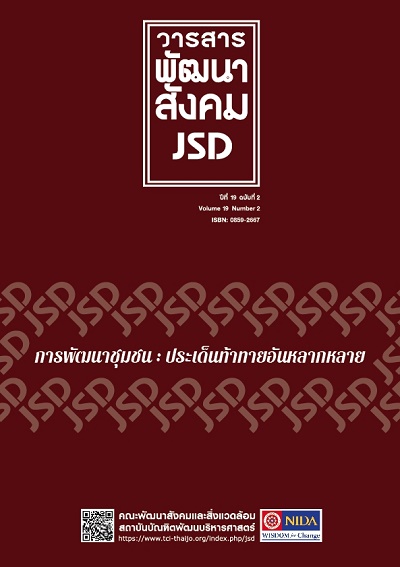ศึกษานโยบายการพัฒนาเศรษฐกิจ สังคมของเขตปกครองตนเองชนกลุ่มน้อยของจีน: กรณีศึกษา เขตปกครองตนเองชนกลุ่มน้อยซินเจียงอุยกูร์
Main Article Content
Abstract
งานวิจัยนี้มีวัตถุประสงค์ 3 ประการ ได้แก่ 1) เพื่อศึกษาสภาพการพัฒนาของซินเจียงทั้งด้านเศรษฐกิจและ สังคม 2)เพื่อศึกษานโยบายของรัฐบาลจีนที่เกี่ยวข้องกับการพัฒนาชนกลุ่มน้อยในจีน ทั้งด้านเศรษฐกิจและสังคมและ 3) เพื่อเอาผลของการศึกษาเป็นข้อเสนอแนะต่อหน่วยงานที่เกี่ยวข้องในการกำหนดนโยบายพัฒนาชนกลุ่มน้อย
การวิจัยครั้งนี้ใช้วิธีวิจัยเชิงคุณภาพโดยการเก็บรวบรวมข้อมูลจากเอกสาร (Documentary Study)สัมภาษณ์เชิงลึก (In-depth Interview) โดยการเดินทางไปเขตปกครองตนเองซินเจียงระหว่างวันที่ 23 ถึง 30 มิถุนายน ปี 2015 และสัมภาษณ์ผู้ให้ข้อมูลสำคัญทั้งหมด (Key informant) 32 คน ทั้งเจ้าหน้าที่ภาครัฐที่ดูแลนโยบายเศรษฐกิจ สังคม ผู้บริหารภาคเอกชนและประชาชนทั้งที่เป็นชาวฮั่นและเป็นชนกลุ่มน้อย
ผลการศึกษาพบว่าในหลายสิบปีที่ผ่านมา 1) เศรษฐกิจของเขตปกครองซินเจียงได้รับการพัฒนาอย่างรวดเร็ว รายได้ของประชาชนเพิ่มมากขึ้น ทำให้ชีวิตความเป็นอยู่ การเข้าถึงการศึกษา รักษาพยาบาล ความเท่าเทียมกันในสังคม ความปรองดองในประชาชนต่างศาสนา ต่างชนชาติดีขึ้น 2) รัฐบาลกลางและรัฐบาลท้องถิ่นเป็นผู้กำหนดนโยบายโดยคำนึงถึงสภาพความเป็นจริงของชนกลุ่มน้อยในท้องถิ่น เช่นนโยบายบุกเบิกตะวันตก นโยบายส่งเสริมการพัฒนาเศรษฐกิจ สังคมของชนกลุ่มน้อยซึ่งมีความสอดคล้องกับสภาพความเป็นอยู่ของท้องถิ่น ในการนำนโยบายไปปฏิบัติอาศัยกลไกของรัฐแบบระบบราชการ มีประสิทธิภาพและประสิทธิผล 3) ได้มีการเผยแพร่ผลของการศึกษา ความรู้ ความเข้าใจเกี่ยวกับซินเจียงสู่สาธารณชนในรูปแบบบทความวิชาการในหนังสือพิมพ์หลายฉบับ นโยบายพัฒนาเขตพื้นที่ชนกลุ่มน้อยทรงคุณค่าแก่การศึกษาสำหรับเขตปกครองตนเองชนกลุ่มน้อยอื่นๆของจีนและประเทศอื่นที่มีหลายหลายชนชาติ
ข้อเสนอแนะเชิงนโยบาย รัฐบาลจีนควรเพิ่มความเข้มข้นการประชาสัมพันธ์ ทำให้ผู้คนมีความรู้ ความเข้าใจซินเจียงมากยิ่งขึ้นเพื่อลดภาพลักษณ์เชิงลบลง รัฐในฐานะผู้กำหนดนโยบายควรให้ความสำคัญกับความไม่เท่าเทียมกันทางเศรษฐกิจของประชาชนภายในเขตเพื่อป้องกันไม่ให้เกิดปัญหาเหลื่อมล้ำทางสังคมในทางวิชาการควรทำวิจัยในมิติทรัพยากรธรรมชาติและสิ่งแวดล้อมต่อไปนอกเหนือจากมิติเศรษฐกิจ และสังคม
This research has three objectives: 1) to explore the region of Xinjiang's economic and social development status; 2) to analyze the Chinese government's policy on economic and social development of ethnic minorities in China and 3) to take the results of the study as a recommendation to relevant agencies to formulate minority development policies.
This research used qualitative approach by collecting both secondary data from documentary study and primary data from in-depth interview. The researcher arranged a trip to the region of Xinjiang between June 23rd and June 30th, 2015 to interview 32 key informants including 8 government officials who were in charge of economic and social policies, 8 private managers and 8 Han citizens and 8 minority citizens.
The results of the research showed that in the past 65 years; 1) the economy of the region of Xinjiang has rapidly developed. The people's income has increased. They can easily access to health care and education. Citizens among different religions, races and nationalities can live equally and harmoniously in the society; 2) the central government and local government are policy makers taking into account the state of local minorities. For example, they have the ‘go-west’ policy which is a policy that promotes economic development of minority communities, suitable with local living conditions. The Policy implementation is conducted by the state bureaucracy efficiently and effectively; 3) the results of the research have been published in the form of academic articles in several newspapers. The ethnic minority development policy is worthwhile studying for other ethnic minorities in China and other countries of many races.
Policy recommendations are: 1) Chinese government should increase public relations to let people understand about the region of Xinjiang better so as to mitigate negative image of the region of Xinjiang. 2) the government as policy-makers should pay more attention to the economic and social inequality of the people within the region so as to prevent social gap;3) In the academic field, the research on the natural resources and environment should be conducted, in addition to the economic and social dimension.


